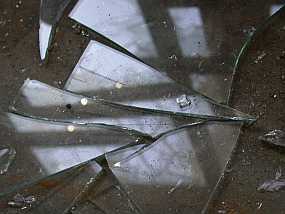 Some arguments that crop up in the Godblogosphere just kill me. If I were a non-Christian, I’d have all the ammo I’d need from blogs alone to make a compelling argument to look somewhere other than Jesus for my salvation.
Some arguments that crop up in the Godblogosphere just kill me. If I were a non-Christian, I’d have all the ammo I’d need from blogs alone to make a compelling argument to look somewhere other than Jesus for my salvation.
Can I reiterate the old aphorism that the biggest argument against Christianity are Christians? Hackneyed, yes, but sadly true.
Last week, the old divisive question of cessationism vs. charismata raised its perpetually ugly head for the umpteenth time over at Pyromaniacs. It seems that we simply can’t let this issue die, as if one more post on it’s going to force one side or the other to capitulate.
Whenever the supporters of a cessationist view want to make their point that all charismatics are “shambalahonda”-babbling, heretical nutjobs, they go to the same well again and again: TBN. The same tired arguments are trotted out. “Look at Benny Hinn! Will you get a load of that screwloose?” Or “What’s with Paul and Jan Crouch? I mean, seriously!”
And thus all charismatics—myself included—are painted with the same exceedingly broad brush. The blanket of condemnation falls on anyone who spoke in tongues after the Apostle John died, and we’re all Benny Hinns, W.V. Grants, and purveyors of error worthy of an extra bucket of red-hot embers when we finally croak and wind up in hell.
But is that the truth?
I’d like readers to bear with me through the next few paragraphs. Don’t even read them unless you’re willing to read to the end. Just stop reading now if you aren’t going to finish this post. I’ll even highlight the questionable words in blue so you know which ones I mean.
Pyromaniacs is a Reformed site. They support 5-point TULIP Calvinism. In truth, we agree on most things, though I understand that my Lutheran theology (though Reformation-inspired) coupled with a belief that the charismata are still working today would not endear me to my brothers there. Certainly, I would not be branded Reformed by their definition.
So while Phil Johnson of Pyromaniacs talks of bad experiences with charismaniacs, I’d like to share my experiences in the Reformed church, since I was a part of a few Reformed churches over the years and have friends who have attended Reformed Calvinist churches.
One Bible study I attended consisted solely of men from a respected, wealthy Reformed church. Before the Bible studies started, these men would sit around and belittle the poor, talking about “those people” and how they were lazy and ignorant. (That they laughed while they tore down “the least of these” made it all the more excruciating for me to even be in the same room with those “Christians.”)
Or let’s consider the Calvinist church that split because some people in that church wanted to evangelize the nearby Hispanic community. Objections swirled that the church would be ruined should “those people” (there it is again!) come in and disrupt things by bringing their culture and customs with them.
Or how about greeters at a Reformed church “greeting” visitors by immediately asking if they were Calvinists, then walking away when the visitors said they did not know?
What can be said of the Reformed church that belittles congregants who can’t afford to send their kids to an exclusive, private Christian school (founded in part by the church)?
Or how about the couple who wanted to start an evangelistic outreach in their Reformed church, but encountered constant apathy on the part of the congregation because “those who were predestined were already in the church”?
In short, which is worse—the babbling, emotional, theology-challenged, snake-handling charismaniac OR the self-righteous, xenophobic, status-seeking, materialistic Reformed/Calvinist?
It’s a pointless question, isn’t it?
If we Christians want to speak words of death in the Church, then by all means let’s resort to naming the worst possible examples of living the Christian life that we might possibly find in some other denomination or sect. Then let’s write as if those worst possible examples were the norm.
I didn’t want to write this post. That this post even needs to be written saddens me. Writing those examples of how some perverse subset of Reformed/Calvinist brothers and sisters ignored the very heart of the Gospel gave me no pleasure at all. Why? Because I know that thousands more Reformed Calvinist brothers and sisters in Christ are NOT like that. In the same way, thoughtful, theologically-sound charismatics who don’t like TBN or the excesses displayed within some charismatic churches exist in large numbers.
Because some Reformed and Calvinist believers are jerks doesn’t negate the Reformed/Calvinist message anymore than wacky charismatics negate theirs. The truth here is that all have sinned and fall short of the glory of God. Before we disparage others from some other flavor of Christianity, we should ask if our own flavor has its house in order. Railing on “those other guys” comes easy to us because few of us wish to acknowledge the problems in our own house. (If Team Pyro wants to correct those Reformed churches I mentioned above, I’ve got the phone numbers for a couple of them. They can drop me an e-mail. I’ve already corrected charismania many times here.)
If Reformed/Calvinists with a keen eye for discernment would work to clean up their house, and Baptists worked to clean up their house, and Nazarenes worked to clean up their house, and charismatics worked to clean up their house, I have an idea that God would bless each house in a profound way. Perhaps then, even our differences wouldn’t seem so large.
But if the Nazarenes decide to point fingers at the mess in the Baptist’s house, and the Reformed/Calvinists decide to ridicule the excesses in the charismatic house, then the world they all live in will go on spinning and the Church of Jesus Christ will smother itself with a blanket of words that kill.
Because I can always find a problem with my neighbor. It’s my own problems I’m not so keen to fix.

 but succumbing in the end because they could not escape the inevitability of that punishing wall of water.
but succumbing in the end because they could not escape the inevitability of that punishing wall of water. We pick many of them by hand and dump them into a jar of soapy water. The soap plugs their breathing holes and that’s that. It’s a lot of work, but weirdly satisfying, too.
We pick many of them by hand and dump them into a jar of soapy water. The soap plugs their breathing holes and that’s that. It’s a lot of work, but weirdly satisfying, too.